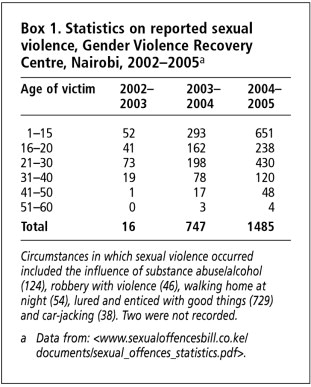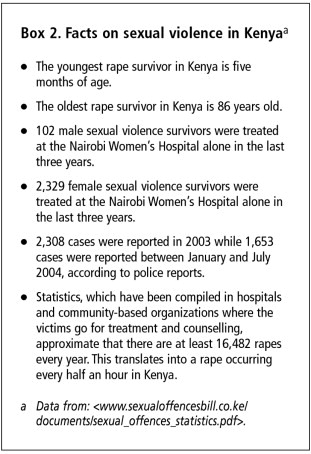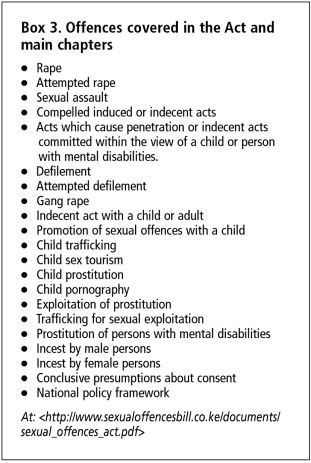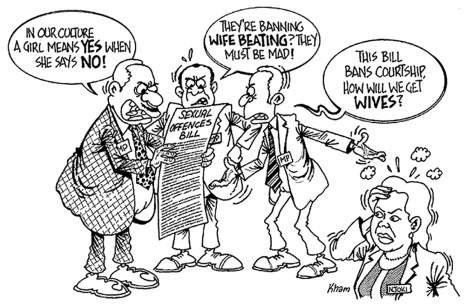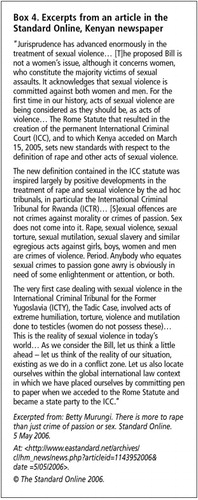Abstract
Sexual violence is rampant in Kenya and the law was not adequately dealing with it. This is an interview by the Association for Women's Rights in Development (AWID) with the Hon. Njoki Ndungu, a Member of the Kenyan Parliament. It is about the history of the development and passage of the Sexual Offences Act, which came into law in Kenya in July 2006. The law contains 14 offences; it has created minimum sentences and criminalised sexual harassment. The media and radio stations had a big role in getting everyone talking about the issues, and support was widespread. Women's organisations and women's rights advocates played an important role, including lobbying members of Parliament, but there were some disagreements about tactics, such as whether demonstrations to support the bill were a good idea or not. The opposition claimed the bill would encourage women to make false rape allegations. As a way to discredit it, they also falsely claimed that it would legalise same-sex relations and abortion. Work is now in progress on a curriculum for training the police, public administration and judiciary on the new Act and its application, as well as a public awareness programme aimed at encouraging people to report incidents of sexual violence.
Résumé
La violence sexuelle sévit au Kenya et la loi n'était pas adaptée à cette situation. L'Association pour les droits de la femme et le développement (AWID) a interrogé Njoki Ndungu, membre du Parlement kényen, sur la rédaction et l'adoption de la loi relative aux délits sexuels qui est entrée en vigueur au Kenya en juillet 2006. Cette loi distingue 14 délits, a créé des peines minimales et pénalisé le harcèlement sexuel. Les médias et les stations de radio ont joué un rôle important pour généraliser le débat sur la question et l'opinion a apporté un large soutien. Les organisations féminines et les militantes pour les droits de la femme se sont beaucoup investies, notamment en faisant pression sur les membres du Parlement, mais elles n'étaient pas toujours d'accord sur les tactiques à employer, par exemple sur l'opportunité d'organiser des manifestations de soutien au projet de loi. L'opposition a affirmé que la loi encouragerait les femmes à faire de fausses accusations de viol. Comme moyen de discréditer le texte législatif, ses détracteurs ont aussi affirmé à tort qu'il légaliserait les relations entre personnes du même sexe et l'avortement. Un programme de formation des agents de police, des fonctionnaires et des officiers judiciaires est en cours de préparation sur la nouvelle loi et son application, de même qu'un programme de sensibilisation pour encourager la population à signaler les incidents de violence sexuelle.
Resumen
La violencia sexual se encuentra desenfrenada en Kenia, y la ley no estaba manejándola adecuadamente. Ésta es una entrevista por la Asociación para los Derechos de la Mujer y el Desarrollo (AWID) con la Hon. Njoki Ndungu, diputada del Parlamento de Kenia. Trata de la historia de la elaboración y aprobación de la Ley contra Delitos Sexuales, que fue promulgada en Kenia en julio de 2006. La ley contiene 14 delitos; creó condenas mínimas y penalizó el acoso sexual. Los medios de comunicación y las estaciones de radio desempeñaron un papel importante en fomentar diálogo al respecto, y el apoyo fue extendido. Las organizaciones de mujeres y defensores de sus derechos realizaron esfuerzos impactantes, como cabildear ante los diputados del Parlamento, pero hubo desacuerdos respecto a las tácticas, como si las manifestaciones para apoyar el proyecto de ley eran una buena idea o no. La oposición sostenía que el proyecto de ley motivaría a las mujeres a hacer falsas acusaciones de violación. Para desacreditarlo, también alegaron falsamente que legalizaría las relaciones homosexuales y el aborto. Actualmente se está elaborando un currículo para capacitar a la policía, administración pública y judicatura sobre la nueva Ley y su aplicación, así como un programa de concienciación pública destinado a motivar a las personas a denunciar los incidentes de violencia sexual.
AWID: Why was there a need to introduce a new law covering sexual offences?
NJOKI NDUNGU (NN): Sexual violence is rampant in Kenya (Boxes 1 and 2) and the law was not adequately dealing with it. Before the Sexual Offences Act was passed, the law on sexual violence was spread through four different pieces of legislation, which complicated matters for victims, the police and judiciary. The definition of the offence of rape was also very limited and the law categorized rape as an issue of morality. It was therefore prejudicial to women who form the majority of sexual violence victims. Sentencing was entirely at the discretion of magistrates and in many cases the punishment for offenders did not fit the crime. There are also new social realities in Kenya, which the law did not take account of, such as HIV and AIDS and child sex tourism, and developments in the field of forensics, such as DNA profiling, which did not exist when the old laws were enacted.
We researched and did a comparative analysis of legislation against sexual violence in different countries; South Africa, Tanzania, Ghana, Australia, the United Kingdom and the United States of America. In the end we borrowed heavily from the Sexual Offences Act, 2003 of the UK, for the reason that having been a British colony, the framework of our legal system and laws is very similar to that of England. Some of the features of the new law include:
| • | There are 14 new offences (Box 3) including gang rape, deliberate infection with HIV/AIDS, trafficking for sexual exploitation, and child pornography. | ||||
| • | The introduction of minimum sentences. | ||||
| • | The setting up of a DNA data bank and a paedophile registry. | ||||
| • | The criminalization of sexual harassment. | ||||
AWID: There seem to have been several starts and stops to this legislation and some people began to doubt that the Bill would ever become law. Why was this so?
NN: Some of the reasons were due to factors beyond my control. For instance, the process was interrupted when Parliament was prorogued by the President in November 2005. Other reasons were strategic, in order to ensure the Bill got the best chance at becoming law. On May 20, 2005 I first presented the motion to the House for permission to bring the Bill. The motion caused a lot of controversy because among other reasons, one of the new punishments for rape that the proposed Bill sought to introduce was chemical castration. This caused a lot of hostility towards the proposed legislation. Also, since the notice of motion was way down on the order of business for the day, I withdrew it and removed the provision for castration. Later, the motion was brought again and passed by the House.
In January this year I republished the Bill. Between January and March 2006, we had consultations with the Parliamentary Committee on the Administration of Justice and Legal Affairs, the police and religious leaders, and also had a workshop for Members of Parliament. We also had weekly consultations with the Attorney-General. All this time amendments were being proposed. There were claims from some conservative religious quarters that the Bill sought to legalize same-sex relations and abortion. This surprised me because knowing the sensitivity of these topics in Kenya, I had gone out of my way to ensure that the Bill did not appear to address these issues. I believe that because in the past I have spoken about the need to discuss abortion due to the effects of the numerous unsafe abortions that are carried out in Kenya, some interest groups see anything I do as an attempt to bring about the legalization of abortion. I had to call each of the religious leaders one by one and discuss this with them. At the end of February I republished the Bill with more amendments. The Bill then went for its first reading. The Committee had proposed some amendments such as the removal of the clause making rape within marriage an offence, and this was removed. The debate during the first reading was very heated and there was a walk out by women MPs. Parliament then went on a two-week recess and we took the opportunity to sensitize women's faith-based groups like the Catholic women's association and the women's guilds. These women on the ground were then able to ask their MPs to pass the law. After the break all the leaders of the political parties came out in support of the Bill. This illustrated how the power of information in the hands of women can be translated into positive change through legislation. The power of the vote should never be underestimated.
In spite of the challenges the fact that we remained focused contributed tremendously to our success. I did know, however, that even if the Bill had not gone through, gains had already been made. The police were already becoming more sensitive, and the judiciary had begun handing down stiffer sentences for sexual offences. It did seem at one stage that the Bill would never become law, but I believe there was some divine intervention!
AWID: There was very strong opposition from a group of MPs. What reasons did they give for opposing the proposed law?
NN: The opposition to the Bill was organized. All this was coming at a time when in Uganda, the leading opposition figure Kizza Besigye was being prosecuted for rape, while in South Africa, former Deputy President Jacob Zuma was also being tried for rape. These cases were perceived by many as political persecution, and several of our MPs claimed that the law we were proposing would encourage women to make false rape allegations in order to punish men.
There were also the deep-seated cultural gender biases that we often face. There is always strong opposition to proposals to enhance the rights and protection of women through legislation.
This is the first piece of “woman-friendly” legislation that has actually been passed by Parliament. Proposals to amend the Marriage Act, the re-introduction of the Affiliation Act that addressed child support for children born out of wedlockWomen in Law and Development in Africa (WILDAF), together with Nairobi Women's Hospital, prepared a nationwide campaign to educate Kenyans on the bill

We had to be ahead of the opposition every step of the way and outmanoeuvre them. They wanted a deletion of the clauses making gang rape and sex with children aged between 16 and 18 illegal, but were not successful. Still, there were some amendments that they succeeded in getting, such as the deletion of a clause that would place criminal responsibility on employers who know that sexual offences are going on in their workplace but do not do anything about it. There was also a clause inserted that provides that a person who makes a false allegation of a sexual offence will receive the sentence that the person against whom the false allegation was made would have received. This amendment took away much of the resistance to the Bill, although I believe the clause is unconstitutional.
Eventually the MPs who opposed the Bill were outnumbered. There was a wave of protest from all over the country against the statement they were making, and the support of the population for the sexual offences law was obvious. The media and FM stations had a big role in getting everyone talking about the issues and so the opposition to the Bill did not prevail.
AWID: What support did you get from civil society?
NN: We received different forms of support from different civil society organizations such as the provision of a secretariat and contribution to research and drafting of the Bill. They also played an important role in enriching the debate about sexual violence and in creating awareness about the Bill.
However, I must say that there needs to be a better appreciation of the division of roles between civil society and law-makers, and in a case such as this one, civil society should have more effectively taken its cue from those of us who were in Parliament pushing for the law. Because civil society cannot legislate, the mode of its engagement with legislators is key in getting progressive laws passed. For instance, because of the climate in Parliament, we asked that certain advocacy methods not be used: demonstrations, petitioning by text messages and so on. However, this advice was not followed and actually served to make the atmosphere more hostile. There needs to be a better understanding of lobbying strategies.
Women's rights advocates have a new found democratic space which we need to utilize in a different way. Previously, our strongest women Parliamentarians were in the opposition. Now they are in government. We now have a Ministry of Gender. Tremendous opportunities have been opened up and civil society needs to adapt its strategies accordingly to make use of the opportunities.
There should also be a greater understanding of how Parliament works. There are different committees in Parliament. You need to understand which Bill is scrutinized by which committee, and then sensitize that committee. That committee will then sensitize the rest of the House. What some NGOs have done is to hold sensitization workshops that do not target members of the right committee.
It was clear too, that some donors did not understand parliamentary procedures, or what role civil society should play in supporting legislative reforms.
AWID: What are some of the other challenges that you faced?
NN: I introduced the proposed legislation to the House as a private member's bill. This is quite different from a government-sponsored bill. Whereas in the case of a government-sponsored bill, civil service technocrats would carry out the necessary research, in the case of a private member's bill, the Member of Parliament bringing the bill has to make his or her own funding, research and drafting arrangements. It was therefore a labour-intensive project. It was also a very costly exercise and I had to finance part of it from my personal resources. I am planning to introduce a Bill on maternal policy, but I am wary of the expense involved.
AWID: What are the next steps, now that the Sexual Offences Act has come into force?
NN: We are now working on a curriculum for the training of police, the public administration and the judiciary on the Act and its application. We are also working on a public awareness programme aimed at among other things, encouraging people to report incidents of sexual violence, which are generally under-reported. It is not enough to have the law on paper; we need to set up the systems that will ensure its effective implementation.
Acknowledgements
Interview reprinted with kind permission of Njoki Ndungu and reproduced from: Association for Women's Rights in Development. Resource Net Friday File, Issue 287, 11 August 2006. At: <[email protected]>. Article by Betty Murungi from: The Standard Online, 5 May 2006. At: <http://www.eastandard.net/archives/cl/hm_news/news.php?articleid=1143952006&date=5/05/2006>. Cartoon by Kham, East African Standard Online Edition, 28 April 2006. At: <www.eastandard.net/archives/cl/cartoon.php?topic=19&img_topic=19&date=28/04/2006>. The interview, cartoon, poster by WILDAF-Kenya and sexual violence statistics were accessed at the Sexual Offences Bill website: <www.sexualoffencesbill.co.ke>. Copyright in each is retained by the original copyright holders.
